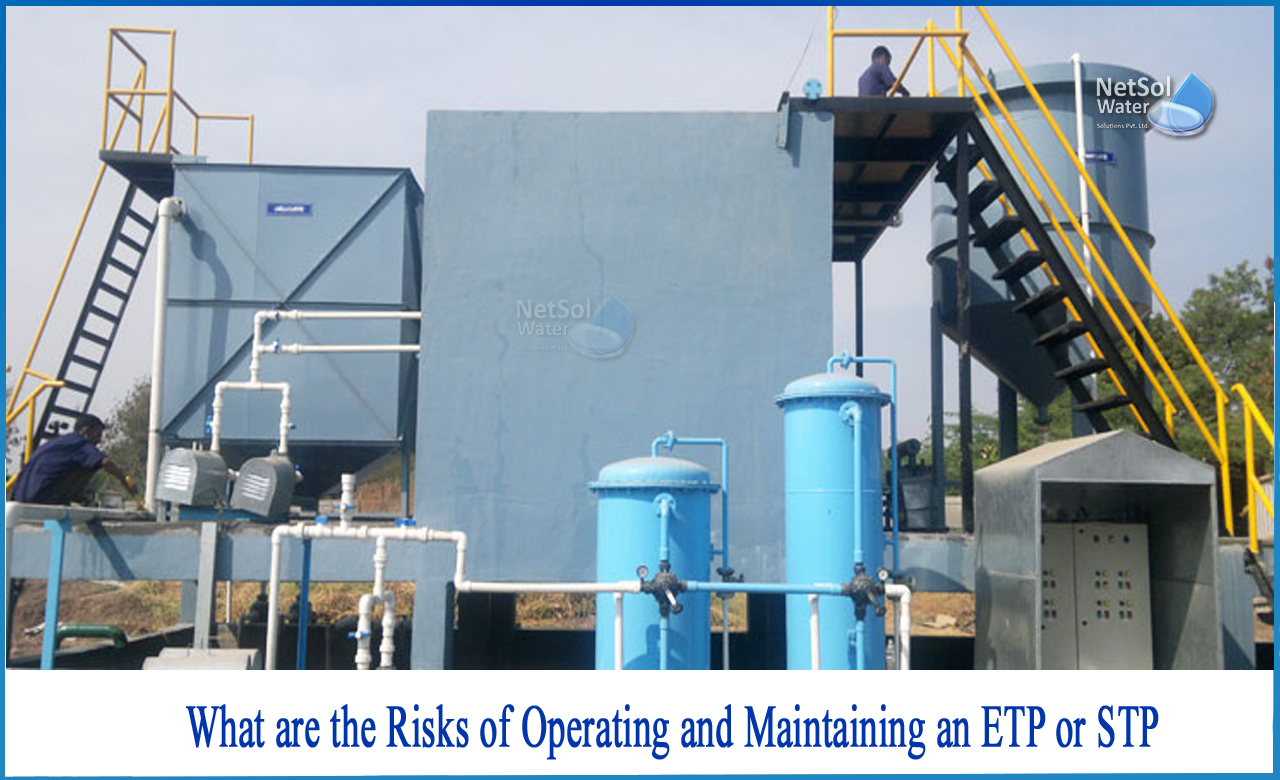Overview
For countries like India that want to revolutionize wastewater management systems, the functional gaps in current sewage systems are huge.
The 2015 CPCB Census Report states that of India's 816 STPs, only about 522 are fully operational and do not utilize their full wastewater treatment capacity. Coverage of wastewater treatment and toilet facilities as part of the “Swacch Bharat mission” increased significantly in 2014, with approximately 60% of the urban population relying on on-site sewage treatment facilities and the remaining 40% is supplied by a sewage system.
ETP operators are routinely exposed to very dangerous chemicals that can cause acute poisoning, chemical accidents (burns, eye injuries, etc.), respiratory damage, allergies, chronic illnesses or it may cause dermatitis. It is important to be aware of the hazards and take the necessary steps to mitigate the operational risks of ETP.
What are the risks of operating and maintaining an ETP or STP?
· Sliding into or falling into pits, ponds, tanks, or purifiers can cause injury or drowning
· Falling or slipping on slippery ground due to solvent or solution
· Risk of choking or lack of oxygen or poisoning
· Burns from hot water or solvent or concentrated acid or base
· Electric shock due to defective electrical equipment
· Cuts and punks from sharp edges
· Fires and explosions due to flammable gases released during the process
· Violent chemical reactions caused by uncontrolled mixing of chemicals
· Poisoning or bacterial infection by drinking untreated sewage
· Smoking and welding in the presence of chlorine-based solvent vapour
How can security be guaranteed with the operation and maintenance of ETP?
· Use safety shoes with non-slip soles
· Wear protective clothing and chemical resistant clothing to prevent skin contact with liquids, vapours, or gases
· Do not mix chemicals without the supervision of a chemist or safety expert
· Check the safety of electrical equipment before use, or at least make sure all wires are properly insulated
· Always wear safety goggles to avoid exposure to smoke, dust, or chemical splashes
· Follow all safety precautions when handling or transporting chemicals such as liquid or gaseous chlorine, concentrated acids or bases, or toxic gases. Wear a respiratory or gas mask if exposed to toxic gas
· Do not drink or eat in areas where biological or chemical contamination is expected
· If hypersensitivity to latex is observed, use non-latex gloves
· All workers need to undergo regular health examinations to detect chronic effects or early signs of allergies
· Learn to use safe lifting and handling techniques for heavy chemical containers. Track mechanical support
First aid for exposure to chemicals:
Inhalation: Remove a person from the source of pollution. Transfer people to fresh air. Perform CPR if the victim is not breathing. See a doctor and keep people warm and calm. Please do not leave.
Ingestion: Remove people from the source of pollution. Do not induce vomiting. Give 2 cups of water every 2 minutes. See a doctor and keep people warm and calm. Please do not leave
Skin contact: Remove the person from the source of contamination and move to the water source immediately. Remove clothing, socks and jewellery from unaffected areas. See a doctor.
In case of contact with eyes: Immediately rinse eyes with lukewarm water for at least 15 minutes. Help the victim by keeping the eyelids away from the eyeball and instructing them to rotate the eyeball.
Conclusion
To summarize the entire article, always wear proper gloves when working with acids, safety shoes, safety masks, goggles, aprons, seat belts, and helmets. Also, make sure you have a first aid kit, a fire extinguisher, and a respirator with a pack bottle in your work area.
If a STP or ETP plant is compliant to all the guidelines and adhering to all rules then probability of disaster decreases over there. In the opposite case the probability of disaster rises. So, plant manager should report any obstacles or problems observed at ETP or STP facility to avoid accidents that may increase workplace safety.
Facility managers and employers must engage employees in workplace safety measures. You can share injury statistics with your employees to inform them of workplace risks. They can also encourage them to represent good safety behaviour in the workplace. These simple initiatives can make a big difference.
Netsol Water is Greater Noida-based leading water & wastewater treatment plant manufacturer. We are industry's most demanding company based on client review and work quality. We are known as best commercial RO plant manufacturers, industrial RO plant manufacturer, sewage treatment plant manufacturer, Water Softener Plant Manufacturers and effluent treatment plant manufacturers. Apart from this 24x7 customer support is our USP. Call on +91-9650608473, or write us at enquiry@netsolwater.com for any support, inquiry or product-purchase related query.



